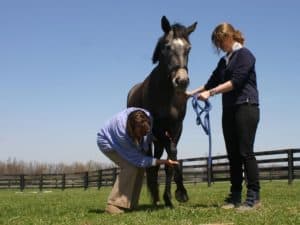TAHC Announces Horseback Emergency Response Team
The Texas Animal Health Commission (TAHC) has announced its new horseback emergency response team. As part of the Texas Division of Emergency Management state response structure, the TAHC is designated as the lead state agency for animal issues in disasters. Launching this group of approximately 20 agency responders will enhance the state’s capability to assist the citizens of Texas with animal issues during disasters.
Amanda Bernhard, TAHC emergency management coordinator, said, "Disasters in the past have revealed the need for responders on horseback to help with livestock handling issues. Public safety as well as animal safety can be compromised when displaced animals are found on public roadways, as occurred during Hurricane Ike in 2008. Experienced riders on horseback will be invaluable in capturing stray livestock, as well as assisting with other ‘search’ or ‘damage assessment’ operations in isolated or affected areas."
The horse responder team is comprised of TAHC animal health inspectors whose primary role in the aftermath of a disaster will be to assist with locating, rounding up, identifying, and moving livestock. The horse team will also perform any other appropriate duties as requested by local and state responders. In general, the TAHC staff will work to reunite stray livestock with their owners, assist local jurisdictions with shelter activities, support any unmet needs of impacted livestock and poultry producers, as well as assist the local veterinary community that may be affected by a catastrophic event.
Dee Ellis, DVM, TAHC executive director and Texas state veterinarian, stated, "The development of a mounted response team is a testimony to the dedication of TAHC personnel. These employees are volunteering to put themselves and their horses in harm’s way to help with emergency response operations. In the future, with proper training, these responders could assist not only with animal disaster issues, but also participate in other response roles as requested, including providing horseback security services, or participating in search and rescue operations
Create a free account with TheHorse.com to view this content.
TheHorse.com is home to thousands of free articles about horse health care. In order to access some of our exclusive free content, you must be signed into TheHorse.com.
Start your free account today!
Already have an account?
and continue reading.
Written by:
Edited Press Release
Related Articles
Stay on top of the most recent Horse Health news with












